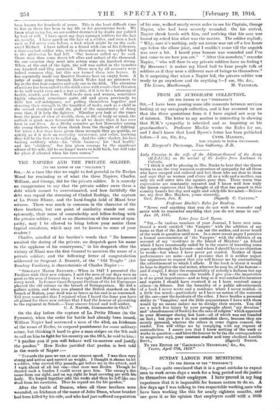THE NAPIERS AND THE PRIVATE SOLDIER. [To THE EDITOR or-
THIS " SPECTATOR"]
Era,—At a time like this .we ought to feelgrateful to Sir Evelyn Wood- for reminding us of what the three .Napiers, Charles, William, and George, did for the private soldier. It is scarcely-
an exaggeration to say that the private soldier -owes- them-. a debt which cannot be overestimated; and how faithfully the debt. was repaid the storming of Ciudad' Rodrigo, the capture of La Petite Rhune, and the hard-fought field ofMianis bear witness. There was -much in common in the: character of the three brothers, but one. point. of similarity. sten& out con- spicuously, their sense of comradeship. and fellow-feeling with the private soldier ; and as an illustration el, this sense of: sym-
pathy, may I be allowed to bring before. your; notice three typical anecdotes, which may not. be known to some of your readers ?
Charles, mindful of his brother's words that " No. honours awaited the daring of the. private, no despatch- gave his name. to the applause of his countrymen," in his. despatch - after the
vietory.of.Miani. was- the first General to mention the name of a private soldier; and • the following" letter of congratulation
addressed to Sergeant J. Bennett, . of the " Old Toughs " (let Bombay Fusiliers), is characteristic of Charles Napier :-
' " SraGEANT MAJOR BENNETT,—When in 1847 I presented the: Fusiliers with their new colours, I.said.the men of our days were as good as the men of former days. I was right,.and Multan has proved every word. In former times Sergeant Graham of the 1St Europeans planted the old colours on the breach of Seringapatam. • He. did a. gallant_ action, and when you .planted the .British .standard .on. the breach of Multan; your deed-was as bravo as his and is-as renowned. Tell your comrades that I rejoiced.when I heard the fame you have all gained for those new colours that I had the honour of presenting to the regiment in Scinde.—Your sincere friend and well-wisher,
C. J. NAPIER, Commander-in-Chief."
On the day before the- capture of La. Petite Rhune (in- the Pyrenees), when the. order for battle. had .already.- been issuedi. William Napier had sentenced a man of the 4ard, .anirishinan of the name of Eccles,-to corporal-punishment for some militaryi
crime, but thinking it hard to give a-znatustripee on the 9th and[ to call on himtn-ightfor his country:on the MI, he said to him :
pardon-=you-if younvill:-behave well Aaanorrow., and' justify.;, the: pardon." How. Eceks: justified that. pardon is. best. told: Ain the-Averds-of Napier :- " Towards the pass-we-ran at ourutmost speed. I. was then very strengandactiva and carried no weight.. I. thought it-shame to, let a soldier, who carried fifty poundsiget before me in the attack, and I went ahead of all but one—that. man: was--Ecolea; Though.. he - carried: suck a burden I- could' never pass him. The- extemy!s.fire came-from our right; and on inyaightlie kept coveringyaw with.. body. We leapetUtegether into the mob and-then•helefflike one- dead from his exertions. Thus he .repaid me.fbr hispardan."
After the battle-. of %woo,. when all • three, brothers were. wounded; an Irishman of then me -of &din Dtinn, whose-brother 'had been killed, by hisside; and Who had justsuffered-ainput Mien of his arm, walked nearly seven miles to see his Captain, George Napier, who had been severely wounded. Oh his. arrival, Napier shook hands with him, and noticing that •his- arm. was bound up asked him what was the matter. The soldier replied:: Why, sure it's-nothing, only me arrum was cut off a few hours ago below the elbow joint, and I couldn't come tilt the anguish was over a bit. I heard your honour was wounded and I've just come to see how you are." " After this anecdote," remarks Napier, " who will • dare to say private soldiers have no feeling ? By Heavens !• it makes my blood boil-to hear people talk of soldiers as if they were a different race of beings-to themselves." Is it surprising that when a Napier led, the -private soldier was ready to go any-where and da anything ?—I am, Sir, &e.,


































 Previous page
Previous page